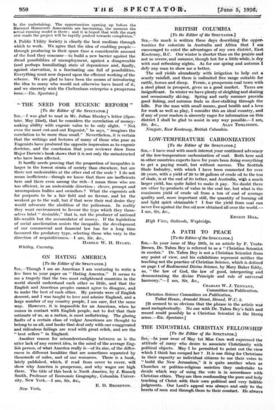" THE NEED FOR EUGENIC REFORM " [To the Editor
of the SPECTATOR.] SIR,—I was glad to read in Mr. Julian Huxley's letter (Spec- tator, May 22nd), that he considers the correlation of money- making ability with eugenic value to be only slight. " Not even the most out-and-out Eugenist," he says, " imagines the
correlation to be more than small." Nevertheless, it is certain that the writings and lectures of many of those who pose as Eugenists have produced the opposite impression as to eugenic doctrine, and the conclusion that your reviewer drew from Major Darwin's book shows that it is not only the uninstructed who have been affected.
It hardly needs proving that the proportion of incapables is larger in the lowest strata of society than elsewhere, but are there not undesirables at the other end of the scale ? I do not mean inefficients—though we know that there are ineffieients here and there even among the rich—I mean those who are too efficient, in an undesirable direction ; clever, prompt and unscrupulous bullies and swindlers ? What the eugenist,s ask for purports to be a fair field and no favour, and let the weakest go to the wall, but if that were their real desire they would advocate the abolition of the policeman. In reality they want environment to favour the type which they them- selves label " desirable," that is, not the producer of national life-wealth but the accumulator of money. If the legislation of social amelioration assists the incapable, the development of our commercial and financial law has for a long time
favoured the predatory type, selecting those who vary in the direction of acquisitiveness.—I am, Sir, &c.,
Whitley, Coventry.
HAROLD W. H. HELBY.










































 Previous page
Previous page